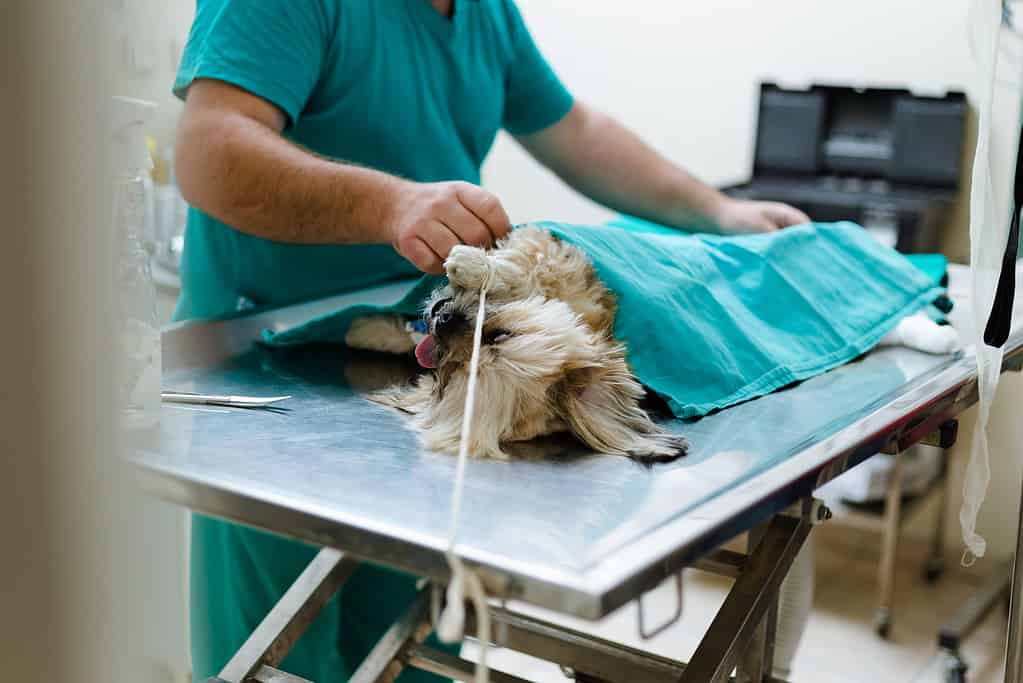Salivary mucocele surgery is a type of head surgery that dogs need if there is a particular problem with their salivary glands – the glands in the head that produce saliva. Luckily, a salivary mucocele can be successfully treated with surgery. Read on to find out why your dog may need salivary mucocele surgery, the costs of the surgery, and more about this troublesome condition.
What Is a Salivary Mucocele in Dogs?
A salivary mucocele is also sometimes called a sialocele and is a collection of saliva that has leaked from either a damaged salivary duct or gland. They look like a swelling in the neck or inside the oral cavity (mouth) – some are quite small but others are very large! Usually, they feel soft to the touch and are painless.
There are actually four types of salivary mucocele but the dog can have more than one type at the same time. The different types are:
- Cervical mucocele: a swelling located in the upper neck under the jaw or between the jaws. This is the most common type.
- Sublingual mucocele: a swelling located on the floor of the mouth by the tongue.
- Pharyngeal mucocele: a rare type of cervical mucocele where the swelling is mainly in the throat.
- Zygomatic mucocele: a very rare swelling of the small salivary glands beneath the eye.
What Causes It?
Often the exact cause cannot be identified. That said, vets often suspect that they occur after trauma and this is likely to be a result of a bite wound, chewing on something hard, or even a choke collar. The salivary gland or duct gets torn, saliva leaks out and pools in surrounding tissue which triggers an inflammatory response leading to even more swelling. A layer of more dense tissue forms around the saliva so it isgets trapped!
It can happen in any dog at any age but is seen more often in some breeds including poodles, German shepherds, dachshunds, and Australian silky terriers.
What Are the Signs of a Salivary Mucocele?
Most owners first notice a swelling on their dog’s neck or around their jaw. It feels soft and ‘fluid’ under your fingers and will be growing! It will not be causing your pet any pain but it may be a nuisance especially if it is large. Some salivary mucoceles make it hard for your dog to eat and they may bite into it as they chew, causing it to bleed. Pharyngeal mucoceles are impossible to see and are only discovered when your dog is examined under anesthetic. They develop in the throat and obstruct the airway so your dog cannot breathe properly. The poor pooch may also have difficulty swallowing and this is a medical emergency.
What Is the Surgical Treatment?
Surgical treatment for a salivary mucocele usually involves removing mandibular and sublingual glands on the side of the mucocele. There is a duct joining the two, so they need to be removed together. Also, there are several vital structures in the area, including the jugular vein so great care is needed during the procedure.
What Is the Cost of Salivary Mucocele Surgery for Dogs?

Small dog under anesthesia lying on operating table ready for surgery in veterinary clinic.
©iStock.com/RobertPetrovic
Salivary mucocele surgery to remove the problematic salivary gland is called a sialoadenectomy. One or more glands can be removed during the procedure. The full cost of the procedure includes before and after care of your dog. Ask what the price that you have been quoted includes, specifically asking about:
- Investigations (x-rays) prior to surgery
- General anesthetic
- Surgery
- Post-surgery medication
- Follow up appointments
The more complex the surgery, the more expensive it will be but it generally falls within $250 to $1,000. Complications and postoperative infections are rare but will increase the price. If both salivary glands are not removed, the condition can reoccur. In cases of sublingual sialoceles, an additional procedure called marsupialization can be performed. This involves a more complex surgical procedure and possibly the insertion of a drain while healing takes place.
What Are the Alternatives to Salivary Mucocele Surgery?
Surgery is the most effective treatment for this condition. Another possible approach is to aspirate (suck out) the fluid from the swelling. This does not provide a permanent solution to the problem and only lasts for weeks or months. It can also introduce bacteria into the mucocele which could cause an infection. This will make eventual surgery harder and riskier.
Helping Your Dog Recover from Salivary Mucocele
When you pick your dog up after surgery, they will probably have a bandage around their head. This will need to be changed frequently to prevent infection. You will also probably be sent home with antibiotics, analgesics, and/or corticosteroids that your dog will need to take for a few days.
Make sure that your recovering pooch gets plenty of rest and doesn’t play any boisterous games. Take them to follow-up appointments that may extend up to two weeks after surgery or longer if there are complications. Drains and sutures (stiches) may need to be removed.
Even though your dog has had their salivary glands removed, they will not have a dry mouth. Very soon they will be able to eat and drink as normal.
How to Pay for Salivary Mucocele Surgery?

You may be able to get help with vets bills.
©insta_photos/iStock via Getty Images
It can be a shock to be told that your dog needs surgery that could cost up to $1,000. Here are some of the ways in which you can get help with funding it.
Pet Insurance
If you have a pet insurance policy, now is the time to dig it out! Contact your insurer and check that salivary mucocele surgery is covered by the policy. Sometimes you have to pay upfront for the treatment but other insurers pay the vet directly. You may still have to pay a portion of the cost yourself. If you do not have pet insurance in place, it is too late to set one up to cover this condition once your dog has been diagnosed.
Shop around
Not all vets charge the same fees. It may be worth getting a few quotes for the surgery. Check out the reviews for the surgery or go by personal recommendation to make sure that you are getting the best care possible for your pet.
Grants and charities
You may be able to get help from a charity or grant of your financial circumstances mean that you cannot afford the surgery for your dog. Try an online search for local charities and funds. The Humane Society provides lots of support and advice for dog owners who are struggling with vet fees. There is also help available for specific breeds.
Flexible Payment Plans
Perhaps your vet offers a flexible way of paying? You may be able to spread the cost of surgery over several weeks or months. The best deals are low interest or even no interest.
The photo featured at the top of this post is © Yavdat/Shutterstock.com
Ready to discover the top 10 cutest dog breeds in the entire world?
How about the fastest dogs, the largest dogs and those that are -- quite frankly -- just the kindest dogs on the planet? Each day, AZ Animals sends out lists just like this to our thousands of email subscribers. And the best part? It's FREE. Join today by entering your email below.
Thank you for reading! Have some feedback for us? Contact the AZ Animals editorial team.






